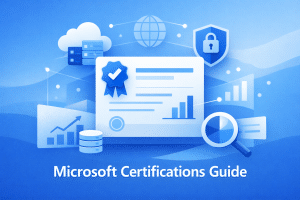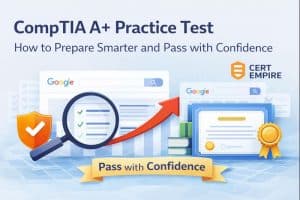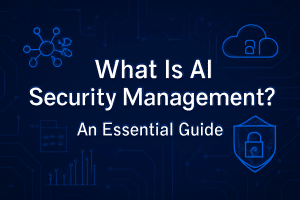TL;DR:
Passing the CompTIA Security+ SY0-701 exam is a big milestone, but it’s only the beginning. After you celebrate, it’s time to leverage that achievement. The best next steps include updating your resume and LinkedIn, applying for cybersecurity jobs, exploring advanced certifications like CySA+ or CISSP, branching into cloud or penetration testing, and building hands-on projects. This guide walks you through 10 practical actions that will help you turn your new credential into career momentum in 2026.
Why Life After Security+ Matters

Many candidates breathe a sigh of relief once they pass the exam—then wonder, “What now?” Security+ is a launchpad, not the destination. Employers view it as a baseline credential that proves you understand core security principles. To really stand out, you need to combine it with experience, specialization, and continuous growth.
That’s where this list of 10 next steps comes in. Each one is designed to help you capitalize on your Security+ success and keep your cybersecurity career moving forward.
1. Update Your Resume and LinkedIn
The moment you pass, your Security+ credential becomes a career asset. Don’t let it sit quietly.
What to do:
- Add “CompTIA Security+ SY0-701 Certified” to your resume headline and certifications section.
- On LinkedIn, update your “Licenses & Certifications” area with the credential ID from CompTIA.
- Highlight not just the certification but also the skills you gained: incident response, network defense, governance, and cloud security.
Why it matters:
Recruiters filter candidates by certifications. By updating right away, you immediately open yourself up to more opportunities.
Internal resource: Check out the Top Industries and Jobs You Can Land with SY0-701 blog for job ideas to target once your profile is updated.
2. Apply for Entry- to Mid-Level Cybersecurity Roles
Security+ is recognized globally and meets baseline requirements for many roles. Don’t wait months—start applying while your knowledge is fresh.
Typical job titles include:
- SOC Analyst (Tier 1)
- Junior Security Analyst
- Information Security Specialist
- IT Auditor
- Network Administrator with Security responsibilities
Salary potential:
According to U.S. Bureau of Labor Statistics, Information Security Analysts earn a median pay of $124,910 per year (as of May 2024). Even entry-level roles can start around $65,000–$80,000 depending on region.
Pro Tip: Tailor your resume for each application. If a role emphasizes compliance, spotlight your knowledge from the Governance, Risk, and Compliance domain of SY0-701.
3. Plan Your Next Certification Step
Security+ is often just the first rung on the ladder. The next best move depends on your career interests:
- CompTIA CySA+ – Focuses on threat detection, SOC analyst skills, and log analysis. Perfect for those who want to stay in defensive operations.
- CompTIA PenTest+ – Great if you’re drawn to offensive security, penetration testing, or ethical hacking.
- CASP+ (CompTIA Advanced Security Practitioner) – For senior professionals who want to design enterprise-level solutions.
- CISSP (Certified Information Systems Security Professional) – Highly respected management-level certification for experienced pros.
- Cloud security certs – AWS Certified Security, Microsoft SC-200, or Google Cloud Security Engineer if you want to pivot into cloud.
Why it matters:
Employers love candidates who show continuous growth. Lining up your next exam signals ambition.
Internal link: Read What’s New in Security+ SY0-701 for 2026 to understand why keeping up with new domains now prepares you for advanced certs later.
4. Build a Hands-On Lab at Home
Passing the exam shows you understand theory, but employers also value hands-on experience. Setting up a simple lab is an inexpensive way to practice real-world skills.
Ideas for your home lab:
- Use VirtualBox or VMware Player to run multiple VMs (Windows Server, Linux, Kali).
- Practice configuring firewalls, IDS/IPS, and VPNs.
- Try log analysis with Splunk free edition or ELK stack.
- Explore security monitoring challenges on platforms like TryHackMe or Hack The Box.
Why it matters:
When interviewers ask about your practical experience, you’ll have real examples to discuss—like setting up a segmented network or simulating a phishing detection scenario.
5. Join Cybersecurity Communities and Networking Groups
Your certification is proof of knowledge, but networking connects you to people and opportunities. Many jobs are filled through referrals, not job boards.
Where to start:
- LinkedIn groups for Security+ and entry-level cybersecurity pros.
- Local ISSA (Information Systems Security Association) or ISACA chapters.
- Reddit communities like r/cybersecurity or r/CompTIA.
- Online study groups or Discord servers where people share interview tips and lab challenges.
How it helps:
- You stay up-to-date on industry trends.
- You hear about unadvertised jobs.
- You get mentorship from experienced practitioners.
Internal link suggestion: For inspiration on where Security+ can take you, revisit the Career Paths for IT Pros with Security+ blog.
6. Continue Your Education with Specialized Training
Cybersecurity is constantly evolving. Passing Security+ proves you’re ready, but specialized training keeps you competitive.
Popular training options:
- Cloud Security Workshops – AWS, Azure, and Google all offer security-focused bootcamps.
- Incident Response & Digital Forensics – Short courses from SANS or university extensions give you advanced investigative skills.
- Secure Coding / DevSecOps – Learn how to identify vulnerabilities in code and apply security in software development.
Why it matters:
The more specialized your skills, the easier it is to carve out a niche. Employers often pay premiums for staff who can solve specific problems.
7. Explore Compliance and Risk Roles
If you enjoyed the Governance, Risk, and Compliance (GRC) domain in SY0-701, you might find compliance-focused roles rewarding.
Common roles:
- IT Auditor
- Compliance Analyst
- Risk Management Associate
Certifications to consider:
- CISA (Certified Information Systems Auditor)
- CISM (Certified Information Security Manager)
- ISO 27001 Lead Implementer
Why this path is powerful:
Regulatory compliance is non-negotiable in finance, healthcare, and government. Professionals who understand both technical security and compliance frameworks are in high demand.
Internal link: For industries where compliance matters most, see Top Industries and Jobs with Security+.
8. Start Freelancing or Contributing to Open Source Projects
Not every opportunity comes from a traditional 9–5 role. Freelancing and contributing to open-source projects let you apply your Security+ knowledge in new ways.
Freelance ideas:
- Vulnerability scanning for small businesses
- Security awareness training for employees
- Building security policies for startups
Open-source contributions:
- Join GitHub security projects
- Help document secure configuration guides
- Contribute to tools like Wireshark or Snort
Benefits:
- Builds your portfolio
- Expands your network
- Shows initiative to future employers
9. Share Your Knowledge Through Teaching or Mentorship
Teaching solidifies your own knowledge and positions you as a professional in the community.
Ways to share:
- Start a cybersecurity blog documenting your Security+ journey.
- Create tutorials or YouTube videos explaining exam domains.
- Mentor peers preparing for Security+ in Discord or LinkedIn groups.
Why it helps:
Employers notice professionals who give back to the community. Plus, explaining complex topics in simple terms demonstrates mastery.
Internal link suggestion: Pair your mentorship with resources like the SY0-701 Cheat Sheet so others benefit from condensed guidance.
10. Define Your Long-Term Cybersecurity Career Goals
Passing Security+ proves you have baseline security skills, but the industry is vast. Clarifying your goals now helps you choose the right next steps.
Ask yourself:
- Do I want to specialize in defense (blue team), offense (red team), or management (GRC/leadership)?
- Am I more interested in hands-on technical roles or policy and compliance?
- Do I want to stay in IT operations, move into cybersecurity architecture, or eventually become a CISO?
Pro Tip: Write down a 2-year and 5-year career plan. Map certifications and job roles to those timelines.
For example:
- 2-year goal: SOC Analyst → CySA+
- 5-year goal: Security Engineer → CISSP
Internal link: Use the Study Plan for SY0-701 as a template to build your own “career study plan.”
Quick Summary Table: 10 Things to Do After Security+
| Step | Action | Why It Matters |
|---|---|---|
| 1 | Update Resume & LinkedIn | Show recruiters you’re certified |
| 2 | Apply for Jobs | Put your new credential to work |
| 3 | Plan Next Certification | Keep your momentum |
| 4 | Build a Home Lab | Gain practical experience |
| 5 | Join Communities | Expand your network |
| 6 | Specialized Training | Deepen skills for niche roles |
| 7 | Explore Compliance Roles | High demand in regulated industries |
| 8 | Freelance / Open Source | Build portfolio and credibility |
| 9 | Teach or Mentor | Strengthen knowledge, build reputation |
| 10 | Set Career Goals | Keep your growth intentional |
To connect all these next steps with core exam knowledge, revisit the CompTIA Security+ SY0-701 pillar guide.
Final Takeaway
Earning the CompTIA Security+ SY0-701 certification is just the start. What you do next determines how far that credential will take you. Whether you choose to pursue advanced certifications, specialize in compliance, build hands-on labs, or even share your knowledge with others, the key is to keep moving forward.


























